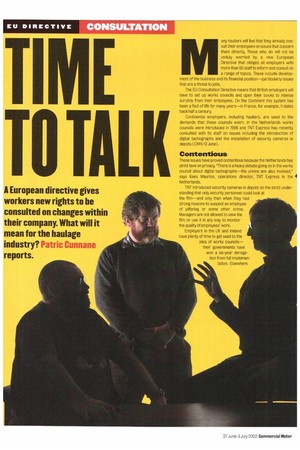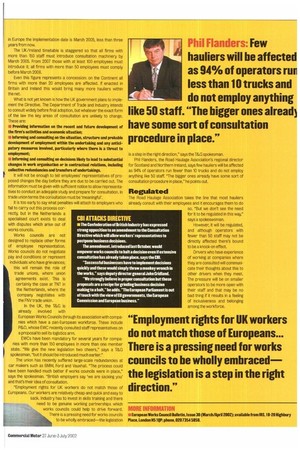A European directive gives workers new rights to he consulted
Page 38

Page 39

If you've noticed an error in this article please click here to report it so we can fix it.
on changes within their company. What will it mean for the haulage industry? Patric Cunnane reports. any hauliers will feel that they already consult their employees on issues that concern them directly. Those who do will not be unduly worried by a new European Directive that obliges all employers with more than 50 staff to inform and consult on a range of topics. These include development of the business and its financial position—particularly issues that are a threat to jobs.
The EU Consultation Directive means that British employers will have to set up works councils and open their books to intense scrutiny from their employees. On the Continent this system has been a fact of life for many years—in France, for example, it dates back half a century.
Continental employers, including hauliers, are used to the demands that these councils exert. In the Netherlands works councils were introduced in 1996 and TNT Express has recently consulted with its staff on issues including the introduction of digital tachographs and the installation of security cameras in depots ( CM6-12 June).
Contentious
These issues have proved contentious because the Netherlands has strict laws on privacy. "There is a heavy debate going on in the works council about digital tachographs—the unions are also involved," says Kees Maurice, operations director, TNT Express in the I Netherlands.
TNT introduced security cameras in depots on the strict understanding that only security personnel could look at the film—and only then when they had strong reasons to suspect an employee of pilfering or some other crime. Managers are not allowed to view the film or use it in any way to monitor the quality of employees' work.
Employers in the UK and Ireland have plenty of time to get used to the idea of works councils— their governments have won a six-year derogation from full implementation. Elsewhere
in Europe the implementation date is March 2005, less than three years from now.
The UK/Ireland timetable is staggered so that all firms with more than 150 staff must introduce consultation machinery by March 2005. From 2007 those with at least 100 employees must introduce it; all firms with more than 50 employees must comply before March 2008.
Even this figure represents a concession: on the Continent all firms with more than 20 employees are affected. If enacted in Britain and Ireland this would bring many more hauliers within the net.
What is not yet known is how the UK government plans to implement the Directive. The Department of Trade and Industry intends to consult widely before final adoption, but whatever the exact form of the law the key areas of consultation are unlikely to change. These are: titi Providing information on the recent and future development of the firm's activities and economic situation: tr.! Informing and consulting on the situation, structure and probable development of employment within the undertaking and any anticipatory measures involved, particularly where there is a threat to employment;
Informing and consulting on decisions likely to lead to substantial changes in work organisation or in contractual relations, including collective redundancies and transfers of undertakings.
It will not be enough to tell employees representatives of proposed changes the day before they are due to be carried out. The information must be given with sufficient notice to allow representatives to conduct an adequate study and prepare for consultation. In trade union terms the consultation must be 'meaningful'.
Works councils are not
designed to replace other forms
of employee representation.
Works councils do not negotiate
pay and conditions or represent individuals who have grievances; this will remain the role of trade unions, where union agreements exist This is certainly the case at TNT in the Netherlands, where the company negotiates with the FNV trade union.
In the UK, the T&G is
already involved with European Works Councils through its association with companies which have a pan-European workforce. These include P&O, whose EWC recently consulted staff representatives on a proposal to sell its logistics arm.
EWCs have been mandatory for several years for companies with more than 150 employees in more than one member state. "We give the new legislation two cheers," says a T&G spokesman, "but it should be introduced much earlier."
The union has recently suffered large-scale redundancies at car makers such as BMW, Ford and Vauxhall. "The process could have been handled much better if works councils were in place," says the spokesman. "British employers say 'we are sacking you' and that's their idea of consultation.
"Employment rights for UK workers do not match those of Europeans. Our workers are relatively cheap and quick and easy to sack. Industry has to invest in skills training and there need to be genuine working partnerships which works councils could help to drive forward. There is a pressing need for works councils to be wholly embraced—the legislation is a step in the right direction," says the T&G spokesman.
Phil Flanders, the Read Haulage Association's regional director for Scotland and Northern Ireland, says few hauliers will be affected as 94% of operators run fewer than 10 trucks and do not employ anything like 50 staff "The bigger ones already have some sort of consultation procedure in place," he points out.
Regulated
The Road Haulage Association takes the line that most hauliers already consult with their employees and it encourages them to do so. "But we don't see the need for it to be regulated in this way," says a spokeswoman.
However, it will be regulated, and although operators with fewer than 50 staff may not be directly affected there's bound to be a knock-on effect.
Drivers who have experience of working at companies where they are consulted will communicate their thoughts about this to other drivers when they meet. The pressure will be on smaller operators to be more open with their staff and that may be no bad thing if it results in a feeling of inclusiveness and belonging among the workforce.
























































































































































